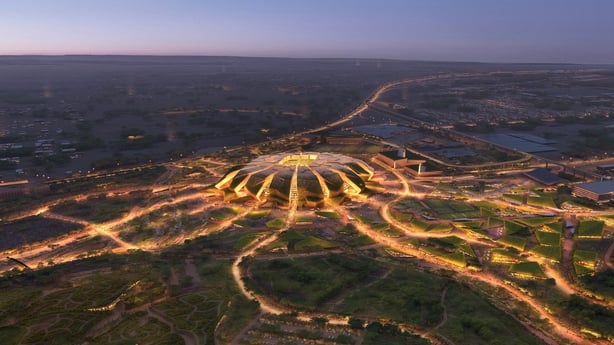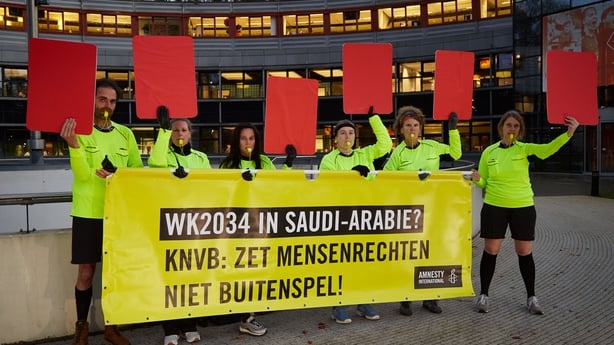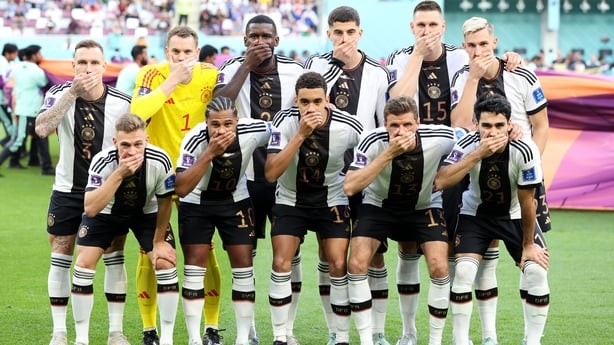Around the time of the 2026 World Cup bidding process, with FIFA's reputation in shreds following major scandals, there were green shoots that the organisation could change.
Having awarded the World Cup to Qatar in 2010 without any conditions on human rights protections - despite the country’s poor record in that area and massive infrastructure deficit - as well as the financial scandals that had engulfed the governing body, it appeared that measures were being taken for a more transparent future.
New human rights requirements for tournaments, developed with the technical support of the Office of the United Nations High Commissioner for Human Rights, were implemented for the first time, requiring candidate host cities to engage with local stakeholders along the way.
"It was really the first global body to include human rights requirements as part of the selection processes," Steve Cockburn, head of labour rights and sport at Amnesty International, tells RTÉ Sport.
"That was a very positive moment in global sport and could have set an example for others."
For an organisation whose prominent past employees include Jack Warner, Chuck Blazer and Sepp Blatter, perhaps it was little surprise that that the new-found sense of morality was built on quicksand.
Those human rights processes for which FIFA was lauded may still exist formally, but in practice they have been quickly discarded.
Last year, the closed FIFA Council suddenly produced an unprecedented plan to combine rival bids for a 2030 tournament - games will be played in Africa, Europe and South America - paving the way for Saudi Arabia in 2034 as the only bidder.

FIFA has yet to explain why it only allowed countries in Asia and Oceania to bid for 2034 when North and Central American nations should have been permitted under the rotation system in place.
Gianni Infantino, who promised to restore FIFA’s standing after taking over from Blatter in 2016, has prioritised trips to Saudi Arabia over most other nations in the last three years, regularly meeting the absolute monarchy's Crown Prince Mohammed bin Salman and even appearing in a government promotional video advertising the virtues of the oil-rich nation.
Infantino's enthusiasm to see the 25th staging of the global event in the sovereign Arab Islamic state is matched by current Saudi Pro-League star Ronaldo, who may or may not have retired by time the event arrives in a decade.
The @Saudi2034bid is inspiring so many young footballers with the promise of #GrowingTogether and it was a pleasure to meet some of those kids who are dreaming of welcoming the world to Saudi Arabia in 2034. 🏆 pic.twitter.com/UiAdh89Wlg
— Cristiano Ronaldo (@Cristiano) December 5, 2024
FIFA Congress this Wednesday will rubber stamp the Saudi bid and the propaganda machine has been operating at full force.
Last week, FIFA’s evaluation report deemed the country "medium risk" for human rights, a staggering conclusion for anyone with even a passing interest on such matters in the country.
Cockburn says the deeply flawed report is further evidence that it was a pre-determined bid from the start. The lack of consultations, the single bid and a lack of minimum standards set out would back up that view.
FIFA agreed with the Saudi federation to limit the scope on topics discussed in the report compiled by the Saudi branch of a law firm.
Conveniently omitted were women's and LGBT rights, forced evictions, trade union rights and freedom of expression.
Corkburn's assertion is that the report - which secured a record score of 419.8 out of 500 - was a sham from start to finish, brandishing it an "astonishing whitewash".

The future of migrant workers in Saudi looks bleak. With more than 13 million migrant workers currently in the country (Qatar had around two million in the lead-up to the last World Cup), that number is expected to increase significantly in a country where trade unions are outlawed.
Amnesty International has been highly critical of FIFA's Qatar World Cup legacy fund, which it claims ignored exploited workers, and predict even greater casualties this time unless radical reforms are quickly introduced.
A 79-page report, 'Die First, and I’ll Pay You Later’ released by Human Rights Watch this month found Saudi authorities are systematically failing to protect migrant workers from grave abuses.
The labour sponsorship system for foreign workers gives employers excessive power over their mobility and legal status in the country. One survey carried out this summer found 65% of migrant workers lack access to their documents, such as passports, and nearly half reported that employers delay or withhold wages to coerce them into staying.
An ITV documentary alleged last month that more than 21,000 Indian, Bangladeshi, and Nepalese workers are alleged to have died in Saudi Arabia since 2017 working on the country’s Saudi Vision 2030, the country's ambitious economic and social transformation plan.
Human Rights Watch has documented that 887 Bangladeshi workers have died in the first six months of this year alone.
Ascertaining official figures is nigh-on impossible in a country where there is no freedom of press and it is a criminal act to contact human rights groups or activists.
An estimated 6,500 migrant workers lost their lives in Qatar on World Cup-related projects after it won the bid in 2010, though the tournament organisers insisted the figure was around 500.
FIFA's own Human Rights sub-committee called for compensation to exploited workers and their families, yet this was ultimately rejected. Last month, a €48m Legacy Fund was launched with bells and whistles, but not a penny for the affected workers.
On publication of the flimsy Saudi Arabia World Cup evaluation report – environmental protection was deemed "low risk" despite no clarity on when the tournament could be played (expect another winter World Cup) - Minister of Sport Prince Abdulaziz bin Turki bin Faisal insisted "young people are looking to a bright future".
Presumably he is referring to Saudi-born male heterosexuals, particularly those who are proponents of male guardianship, the system in Saudi Arabia that considers women legal minors until the end of their lives.
There are expected to be few dissenters among the FIFA gathering later this week, with the Norwegian FA one of the few to publicly express any misgivings.

Current players are unlikely to stick their head above the parapet; Germany captain Joshua Kimmich last month stated that players are not political experts.
German football players covered their mouths during the team photo before their World Cup opener three years in protest against FIFA's ban of pro-LGBTQ+ armbands, something Kimmich feels brought about little benefit.
"We did not present an overall good picture as a team and country," he said. "We expressed political opinions and it took a bit away from the joy of the tournament."
Given the lack of press freedom, understanding what the general public truly feel is an onerous task, but perhaps the general population aren't as enthused as those in public office.
Human rights activist Lina Alhathloul, whose sister Loujain was tortured, placed in a maximum-security prison after campaigning for women's right to drive and to end Saudi Arabia’s male guardianship system, says the Western world needs to separate citizens from state.
"Do not listen to the discourse of the authorities," she told RTÉ Sport.
"We are asking people to stand in solidarity with us, to differentiate between the Saudi people and the Saudi authorities."


